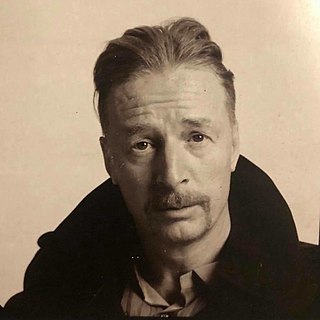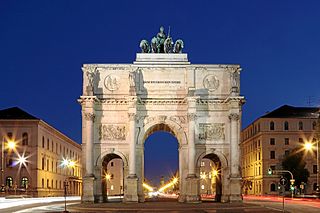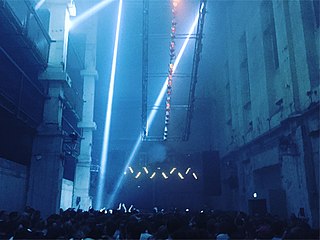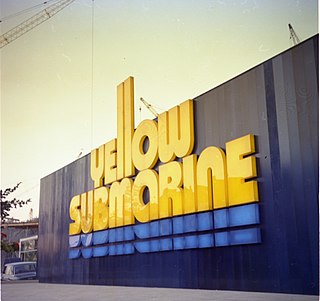Related Research Articles

A rave is a dance party at a warehouse, club, or other public or private venue, typically featuring performances by DJs playing electronic dance music. The style is most associated with the early 1990s dance music scene when DJs played at illegal events in musical styles dominated by electronic dance music from a wide range of sub-genres, including drum and bass, dubstep, trap, break, happy hardcore, techno, hardcore, house, and alternative dance. Occasionally live musicians have been known to perform at raves, in addition to other types of performance artists such as go-go dancers and fire dancers. The music is amplified with a large, powerful sound reinforcement system, typically with large subwoofers to produce a deep bass sound. The music is often accompanied by laser light shows, projected coloured images, visual effects and fog machines.

Electroclash is a genre of popular music that fuses 1980s electro, new wave and synth-pop with 1990s techno, retro-style electropop and electronic dance music. It emerged in the late 1990s and was pioneered by and associated with acts such as I-F, DJ Hell, Miss Kittin and The Hacker, and Fischerspooner.

Helmut Josef Geier, known professionally as DJ Hell, is a German DJ.

Schwabing is a borough in the northern part of Munich, the capital of the German state of Bavaria. It is part of the city borough 4 (Schwabing-West) and the city borough 12 (Schwabing-Freimann). The population of Schwabing is estimated at about 100,000, making it one of the largest districts of Munich. The main boulevard is Leopoldstraße.
An afterhours club is a nightclub that is open past the designated curfew closing time for clubs that serve alcohol. Such clubs may cease serving alcohol at the designated time, but have special permission to remain open to customers and to sell non-alcoholic sodas and often highly caffeinated drinks.

Tom Novy is a DJ and producer from Munich, Germany.
International DeeJay Gigolo Records is a German electronic music record label run by techno artist DJ Hell. The label was founded in Munich in 1996 by DJ Hell and DJ Upstart as an affiliate of label Disko B. It is Germany's most successful electronic music record label, specialising in electro, house and techno with 80's pop and disco influences. "Gigolo" has released records by Dave Clarke, Jeff Mills, DJ Hell, David Carretta, Miss Kittin & The Hacker, Kiko & Gino S., DJ Naughty, The Penelopes, The Advent, Dopplereffekt, Terrence Fixmer, Japanese Telecom, Fischerspooner, Tiga, Belgian Dj Valium, Princess Superstar and Vitalic. In particular, the label is widely credited as being the germ cell of the electroclash music genre in the late 1990s.

Musicland Studios was a recording studio located in Munich, Germany. Originally it housed a Helios console which was favored by many of the bands from that era. It was established by Italian record producer, songwriter and performer Giorgio Moroder in the early 1970s. The studio was situated in the basement of the Arabella High-Rise Building.

Munich-Riem Airport was the international airport of Munich, the capital city of Bavaria and third-largest city of Germany. It was closed down on 16 May 1992, the day before the new Munich Airport commenced operations. It was located near the old village of Riem in the borough of Trudering-Riem in the east of Munich.
Techno is a genre of electronic dance music (EDM) which is generally produced for use in a continuous DJ set, with tempo often varying between 120 and 150 beats per minute (bpm). The central rhythm is typically in common time (4/4) and often characterized by a repetitive four on the floor beat. Artists may use electronic instruments such as drum machines, sequencers, and synthesizers, as well as digital audio workstations. Drum machines from the 1980s such as Roland's TR-808 and TR-909 are highly prized, and software emulations of such retro instruments are popular.

Thomas Andrezak, better known as Tanith, is a German DJ and producer of electronic dance music. From 1990 to 1996 he was one of the most popular German Tekkno DJs.

Union Move was a technoparade that occurred annually in Munich from 1995 to 2001. It was an initiative by Munich event organizers and nightclub owners to demonstrate against the Munich curfew and excessive police controls. A recurring motto of the parade was "Music is the only drug!". The first Union Move took place on 27 May 1995 and attracted 60,000 people. The 1996 parade for the first time attracted 100,000 people, as well as the 1997 parade which involved 16 trucks equipped with sound systems. The next three parades attracted between 60,000 and 70,000 people, but in 2001 attendance declined. The parade usually started at Münchner Freiheit square and continued over Leopoldstraße all the way to Odeonsplatz, and in the first years even further over Isartor to Marienplatz where the final took place. After the final ravers could board a Housetram and this way continue partying through the city. At night the festival was continued at multiple after-parties in the local nightclubs under the motto Night Move. In 2015 an initiative was launched to revive the parade. So far, however, these attempts have not been successful.

MMA Club(Mixed Munich Arts Club) was a techno nightclub in Munich, Germany, renowned as one of the best in Germany in the 2010s. It was a multifaceted establishment based inside the husk of an old thermal power plant and has hosted underground techno DJs such as Richie Hawtin, Adam Beyer, Len Faki, Ben Klock, Marcel Dettmann, Ben Sims or Terence Fixmer, among many others. The maze-like club also contained a 460-square-meter gallery space frequently utilized for a variety of theatrical, artistic and orchestral performances.

Ultraschall was a nightclub in Munich, Germany from 1994 to 2003. The techno club belonged, besides the Tresor and E-Werk in Berlin, the Dorian Gray and Omen in Frankfurt, and the Munich-based clubs KW – Das Heizkraftwerk, Natraj Temple and Millennium, to the most renowned clubs of Germany's 1990s techno culture. According to FazeMag, Ultraschall was "for many techno fans the most authentic techno club alongside the Tresor".

KW – Das Heizkraftwerk was a nightclub in Munich, Germany from 1996 to 2003. The techno club belonged, besides the Tresor and E-Werk in Berlin, the Dorian Gray and Omen in Frankfurt, and the Munich-based clubs Ultraschall, Natraj Temple and Millennium, to the most renowned clubs of Germany's 1990s techno culture.

The Blow Up (1967–1972) was a famous nightclub in Munich and Germany's first large-scale discotheque. During its existence, the nightclub was the favorite topic of magazines and daily newspapers because of countless happenings, drug stories and its psychedelic light projections. The British Pathé described the club as being "the hottest and most expensive happening center in West Germany. It's wild, it's way-out, it's with it, it's got everything."

The Blitz Club is a techno nightclub in the Munich district of Ludwigsvorstadt-Isarvorstadt.

Natraj Temple [] was a nightclub in Munich, Germany from 1996 to 2008. Germany's first steady psytrance nightclub belonged, besides the Tresor and E-Werk in Berlin, the Dorian Gray and Omen in Frankfurt, and the Munich-based clubs Ultraschall, KW – Das Heizkraftwerk and Millennium, to the most renowned clubs of Germany's 1990s techno culture, and was considered an international centre of the Goa trance movement.

The Yellow Submarine was a nightclub in Munich and Germany's first underwater discotheque.
The Big Apple was a nightclub in Munich's Schwabing district from 1963 to 1975 and, together with the PN hit-house, formed the center of the southern German beat and rock music culture during the Swinging Sixties.
References
- ↑ Thillmann, Paulina (29 November 2017). "Deutschlandkarte: Legendäre Clubs" [Germany map: legendary clubs]. Zeitmagazin . Retrieved 12 August 2022.
- 1 2 "25 Legendary Clubs That Made German Techno Party Culture What It Is Today". Electronic Beats. 2 June 2017. Retrieved 12 August 2022.
- 1 2 Hecktor, Mirko; von Uslar, Moritz; Smith, Patti; Neumeister, Andreas (1 November 2008). Mjunik Disco – from 1949 to now (in German). ISBN 978-3936738476.
- 1 2 Fischer, Marc; von Uslar, Moritz; Kracht, Christian; Roshani, Anuschka; Hüetlin, Thomas; Jardine, Anja (14 July 1996). "Der pure Sex. Nur besser" [The pure sex. Only better.]. Der Spiegel (in German). Retrieved 12 August 2022.
- ↑ Wagner, Dirk (17 May 2010). "Mixen am Grill" [Mixing on the grill]. Süddeutsche Zeitung . Retrieved 12 August 2022.
- 1 2 "Tom Novy: 50 Jahre – 50 Fragen" [Tom Novy: 50 years – 50 questions]. Faze Magazin. 10 March 2020. Retrieved 12 February 2022.
- 1 2 DJ Hell at Kulturdonnerstag. Kulturdonnerstag. 28 January 2021. Retrieved 12 August 2022.
- 1 2 3 4 "Babalu" (PDF). Flashtimer. December 2011. Archived from the original (PDF) on 5 March 2023. Retrieved 10 February 2022.
- ↑ Pfnür, Martin (25 March 2015). "Menschenleserin" [Human reader]. Süddeutsche Zeitung . Retrieved 12 August 2022.
- ↑ Yang, Xifan (7 June 2010). "Plattenkaufen ist wie Vokabellernen für's Wochenende" [Buying records is like learning vocabulary for the weekend]. Jetzt. Retrieved 10 February 2022.
- ↑ "Woody – Biography". Resident Advisor . Retrieved 12 August 2022.
- 1 2 "Klaus Löschner aka DJ Good Groove gestorben" [Klaus Löschner aka DJ Good Groove died]. Faze Magazin. 22 February 2014. Retrieved 12 August 2022.
- 1 2 "Michi Kern" (PDF). Flashtimer. November 2007. Archived from the original (PDF) on 5 March 2023. Retrieved 12 August 2022.
- ↑ Kröplin, Sofia (6 December 2019). "Faze Trip #München (Part 1) – Wo kommt eigentlich der Münchner Techno her?" [Faze Trip #Munich (Part 1) – Where does Munich Techno actually come from?]. Faze Magazin. Retrieved 12 August 2022.
- ↑ Ertl, Christian (2010). Macht's den Krach leiser! Popkultur in München von 1945 bis heute[Turn down the noise! Pop culture in Munich from 1945 to today] (in German). Allitera Verlag. ISBN 978-3-86906-100-9.
- ↑ "25 Jahre Rave on Snow" [25 years Rave on Snow]. Partysan. 12 November 2018. Retrieved 12 August 2022.
- ↑ "The novel documenting rave culture in reunified Germany". Vice. 4 August 2020. Retrieved 12 August 2022.